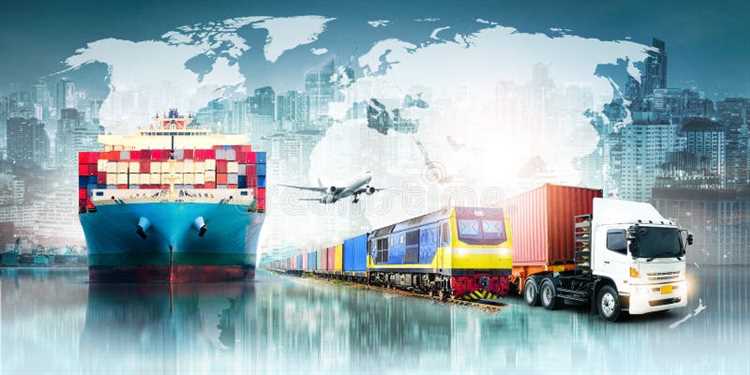Contpark specializes in offering a robust terminal management solution. Its platform includes features for real-time visibility, workflow automation, and security, simplifying terminal operations and increasing productivity.

Container trailers, also known as TLRs, are an integral part of the logistics and freight industry. They play a crucial role in the transportation of goods across various modes of ground and air transportation. A container trailer is designed to carry containerized cargo, making it efficient and convenient for shipping logistics services.
With the increasing demand for haulage services, container trailers have become an essential component of the supply chain. They provide logistic solutions for the loading and unloading of palletized freight, ensuring smooth and secure transportation. Whether it’s for import or outbound distribution services, container transport services offer a reliable and cost-effective means of cargo handling.
The logistic industry heavily relies on container trailers to facilitate the movement of goods. Container trailers are highly automated, equipped with advanced technologies for seamless hauling. They are designed to withstand the challenges of ground transportation, ensuring the safe delivery of cargo. As a result, transportation companies heavily utilize container trailers in their operations.
Container trailers are primarily used for container freight, enabling efficient transportation of goods via road, sea, or air. They are specifically designed to be compatible with container infrastructure, allowing for easy loading and unloading. This makes container trailers an ideal choice for businesses involved in international trade and air logistics.
Whether it’s a freight truck or a container trucking service, container trailers are a versatile option for the logistic industry. They can handle a wide range of cargo and provide efficient transportation solutions for inbound and outbound freight. With their ability to carry containers of various sizes and types, container trailers offer immense flexibility for carriers and logistic service providers.
In conclusion, container trailers are a vital component of the logistic industry, offering efficient and reliable transportation solutions. Their ability to handle containerized cargo and adapt to different modes of transportation makes them indispensable for the supply chain. With the growing demand for logistic services, container trailers continue to play a crucial role in the movement of goods across various sectors.

A container trailer, also known as a TLR (Trailer-on-Flatcar) or intermodal trailer, is a type of freight trailer designed specifically for container transport services. These trailers are widely used in the transportation and logistics industry for the efficient distribution of goods.
A container trailer is an essential part of the transportation and logistics process, particularly in the field of maritime logistics. It plays a crucial role in the supply chain, ensuring that goods are efficiently transported from one location to another, whether it be by land, sea, or air logistics.
Container trailers are commonly used for bulk freight shipping, as they provide a secure and efficient method of container handling. They come in various sizes and types to accommodate different types of containers, such as standard 20-foot and 40-foot containers, as well as specialized containers for specific transportation services.
Container trailers are a fundamental component of freight transportation services, providing a reliable and effective means of transporting goods from one place to another. They are widely used in supply chain management and play a key role in the operation of haulage and logistics companies.
These trailers are utilized in various aspects of freight management, including the transportation of goods from a warehouse to a distribution center, as well as the shipment of goods to customers. They are versatile and suitable for both long-haul and short-haul transportation, making them an essential tool in the logistics and supply chain industry.
Container trailers are used by freight handlers, who are responsible for the loading and unloading of containers, ensuring that goods are secure and properly stored during transport. These trailers are integral to the efficient functioning of freight logistics, providing a reliable and convenient storage solution for goods during transit.
The infrastructure supporting container trailers, such as trailer yards and container depots, is an integral part of the transportation and logistics industry. These facilities provide essential logistics support, ensuring that trailers are maintained, repaired, and readily available for use.
In summary, container trailers are a crucial component of the transportation and logistics industry, facilitating the efficient and secure transport of goods. They provide a reliable logistics solution for the distribution of goods, serving as the backbone of freight transportation services.

The truck trailer is a common and versatile type of container trailer used for freight transportation. It is typically pulled by a truck driver and can be easily transported on the road. Truck trailers are often used in conjunction with railcar fleets and transport lines to efficiently move cargo between different locations.
Maritime logistics plays a crucial role in global cargo transportation. Container trailers are often used in maritime logistics to transport goods between the port and distribution centers. The efficient management of container infrastructure and the coordination of shipping fleets are essential to ensuring smooth and timely delivery of goods.
Rail transportation is another important part of the freight infrastructure. Container trailers are commonly used in rail logistics to transport goods across long distances. This method of transportation is cost-effective and eco-friendly, making it a preferred choice for many businesses.
Air logistics is a fast and efficient method of cargo transportation, especially for time-sensitive goods. While container trailers are not directly used in air logistics, they play a crucial role in connecting the transport network. Container trailers are used to transport cargo to and from airports, providing seamless integration between different transportation modes.

Transit warehouses are an integral part of the logistics network. Container trailers are used to transport goods to and from transit warehouses, providing temporary storage space and facilitating the loading and unloading of cargo. This ensures efficient distribution and allows for smooth transitions in the supply chain management.
Freight forwarding and logistics services involve the movement of goods from one location to another. Container trailers are a key component in this process, providing the means to transport goods efficiently and securely. Logistic service providers utilize container trailers to optimize the transportation and logistics operations, ensuring the smooth flow of goods in the distribution line.
The use of container trailers provides numerous benefits in the freight industry and supply chain logistics. These trailers are designed specifically for the transportation of shipping containers, making them an essential tool for companies involved in cargo shipping and logistic services.
One major advantage of container trailers is their ability to streamline the export and import process. They allow for easy and efficient loading and unloading of containers, reducing the time and effort required for freight management. This improves the overall efficiency of the supply chain logistics, enabling companies to meet tight deadlines and deliver goods in a timely manner.
Container trailers also play a crucial role in warehousing operations. With their container handling capabilities, they provide convenient storage options for goods within the warehouse. This enables companies to effectively manage their inventory and ensure the smooth flow of products through the supply chain. Additionally, container trailers allow for consolidation, enabling companies to combine multiple shipments into a single container, thereby reducing costs and maximizing efficiency.
Another benefit of using container trailers is their compatibility with various modes of transportation. They can be easily transported by truck for overland transportation or loaded onto ships for international shipping. This versatility makes them an ideal choice for shipping companies and movers who need reliable and flexible cargo transportation services.
Furthermore, container trailers contribute to the safety and security of goods during transit. They offer enhanced protection against theft and damage, as containers can be securely locked and sealed. This gives companies peace of mind that their valuable cargo is well-protected throughout the journey.
In summary, container trailers offer a range of advantages for the freight and logistics industry. From improving export and import processes to providing efficient warehousing services, they play a vital role in supply chain management. Their versatility, efficiency, and security make them indispensable tools for companies involved in the freight industry and logistic services.
Container trailers, also known as TLRs, are widely used in the intermodal logistics industry for transporting containers. These trailers play a crucial role in the container transport industry, enabling efficient transportation and shipping of goods.
The main use of container trailers is in inventory logistics, where they are utilized to transport containers between different locations. Container handling services rely on these trailers for the efficient loading and unloading of cargo, making it easier to manage shipping transportation.
Container trailers are an essential component in the haulage and supply chain process. They enable movers to transport containers from one location to another, ensuring smooth cargo delivery. These trailers are commonly used in the trucking industry for freight shipping and are a vital part of the logistics infrastructure.
Logistics and freight companies heavily rely on container trailers for transportation management and logistical operations. Drayage operations, which involve the pickup and delivery of containers from ports to nearby locations, also heavily utilize these trailers. They are an integral part of the containerized supply chain.
Container trailers contribute to the consolidation of goods and containers, making it easier to transport large quantities of cargo in a single shipment. They are commonly used in ocean cargo shipping, where containers are loaded onto ships for transportation to various destinations.
In summary, container trailers are extensively used in the transportation and shipping industry for cargo delivery, warehousing, and logistics operations. These trailers provide a vital link in the supply chain, enabling the efficient and cost-effective movement of goods.
When choosing a container trailer for your freight transportation needs, there are several key features to consider to ensure efficient logistics and smooth shipping and delivery processes.
The container trailer should be designed to accommodate different sizes and types of containers commonly used in the shipping industry, such as standard 20-foot and 40-foot containers. This will enable seamless integration with container ship transportation and allow for easy cross-docking and transfer of cargo.
The freight trailer should provide ample storage capacity to accommodate different types of cargo, including bulk goods or packaged inventory. This is crucial for logistics coordinators and freight forwarders who deal with a variety of shipping and logistics services.
The container trailer should have features that enable efficient handling and loading of cargo. This includes securement mechanisms, such as lashing points or twist locks, to ensure the safety and stability of the cargo during transport. Additionally, the trailer should allow for easy loading and unloading, whether using forklifts or manual labor.
A versatile freight trailer can adapt to different transport logistics requirements, including rail or truck delivery. This flexibility allows for efficient distribution services and streamlines the logistics process for import or export operations.
Choosing a container trailer with sturdy construction, durable materials, and proper maintenance can help minimize downtime and delays. This is especially important for frequent use in the maritime transportation industry, where the trailer may be subjected to harsh weather conditions and potential damage.
An ideal container trailer should seamlessly integrate with other logistics solutions, such as warehousing and storage services. This allows for efficient inventory logistics, packaging, and easy transfer of goods between different stages of the supply chain.
By considering these key features, logistics professionals, including freight carriers and logisticians, can select a container trailer that best suits their shipping and logistics requirements, ensuring smooth operations and timely delivery of goods.
Loading and unloading a container trailer is a crucial task in the freight trailer industry. It is essential to ensure the efficient transfer of goods from the warehouse to the destination. Proper handling of the container trailer is vital for the smooth flow of the supply chain logistics.
When it comes to loading and unloading a container trailer, the first step is to find a suitable trailer park that can accommodate the freight fleet. This is where logistics management plays a crucial role in coordinating the transport industry.
Once the container trailer is parked at the warehouse, the loading and unloading process begins. The goods are typically transported to and from the trailer via overland transportation or air transportation, depending on the specific logistic support required.
Shipping container logistics is an integral part of maritime logistics, as containers are commonly used for transporting goods internationally. Freight carriers specializing in containerized shipping and transport handle the loading and unloading process with great care to ensure the safe transportation of goods.
Transportation and warehousing are interconnected in the logistics chain, with trucking companies often involved in both aspects of the process. Export businesses heavily rely on efficient loading and unloading practices to streamline their operations and meet customer demands.
In conclusion, loading and unloading a container trailer requires meticulous planning, coordination, and attention to detail. The seamless flow of goods through the supply chain relies on proper handling and management of the freight trailer. By ensuring efficient loading and unloading, businesses can optimize their transportation and logistics operations.
Container freight is an essential aspect of the shipping and transportation industry. Properly securing cargo on a container trailer is crucial for ensuring the safe delivery of goods. Whether you are loading or unloading a container, following these tips can help you avoid accidents and damages during the shipping process.
Following these tips for properly securing cargo on a container trailer will help ensure the smooth and safe delivery of your goods. Effective logistics management in container freight is crucial for supply chain operations, and proper cargo securing plays a significant role in maintaining the integrity of the transportation infrastructure. By partnering with a reliable logistic provider and adhering to secure loading and unloading practices, you can minimize risks and promote efficient distribution logistics.
Container trailers, also known as freight trailers, play a crucial role in the logistic management of the transport industry. These trailers are specifically designed to haul containerized cargo, ensuring its safe transportation from one location to another. As such, there are various regulations and requirements in place to ensure the smooth operation of these trailers.
One important aspect is the weight restrictions imposed on container trailers. Truck drivers and shipping companies need to comply with weight limits to ensure the safety and efficiency of the transportation process. Additionally, specific regulations govern the securing of cargo within the trailers to prevent any damage or accidents during transit.
Shipping lines and companies that operate container trailers must also adhere to regulations related to documentation and inventory management. Accurate record-keeping of cargo, including proper labeling and documentation, ensures efficient handling and tracking of shipments. This is especially crucial for international shipping, where compliance with customs regulations is essential.
Container trailers are often part of a larger logistics chain that includes other modes of transportation, such as rail logistics or air transportation. In the case of intermodal transportation, where cargo is transferred between different modes, additional regulatory requirements come into play. These requirements ensure coordination and seamless transfers between different transportation providers.
Furthermore, container trailers may need to comply with regulations specific to the type of cargo being transported. For example, perishable goods may require specialized trailers equipped with temperature control systems, while hazardous materials have strict safety protocols that must be followed during transport.
In summary, container trailers are subject to a range of regulations and requirements to ensure the safe and efficient transport of cargo. Compliance with weight restrictions, cargo securing, documentation, and specialized regulations for different types of cargo are all essential for the smooth operation of the shipping industry’s trailer fleet.
Container trailers, also known as TLRs, play a vital role in the freight transportation industry. They are essential for shipping companies and logistics providers to efficiently transport goods and cargo. To ensure the smooth operation and longevity of container trailers, proper maintenance and safety measures must be taken.
Regular Maintenance:
Safe Cargo Handling:
Transportation and Safety:
By following these maintenance and safety tips, the container transport industry can ensure smooth operations, minimize accidents, and maximize the lifespan of container trailers. Safety must always be a top priority in the transportation and shipping of goods and cargo.
The shipping and transport industry heavily relies on container trailers for overland transportation. These trailers play a crucial role in the movement and delivery of cargo, making them essential for logistics support.
However, container trailers can encounter several issues that may affect the efficiency of freight transport. Here are some common problems and troubleshooting solutions:
By addressing these common container trailer issues, the shipping and logistics industry can enhance overall operational efficiency and streamline the movement of goods by road, sea, and air.
When it comes to shipping logistics and distribution logistics, containerization plays a crucial role. Container trailers, also known as TLRs, are an essential part of the freight industry, specifically for shipping container transport. If you are in need of a container trailer for your transport fleet or are looking to start a container transport company, here are some key points to consider.

The first step in finding and buying a container trailer is to identify your specific requirements. Determine the size and weight capacity your business needs, whether it’s for bulk transportation or palletized cargo delivery. Consider the logistic provider and the logistics infrastructure you are working with to ensure compatibility.
Do thorough research on container transport companies and freight carriers in your area. Look for reviews and testimonials to get an idea of their reputation. Compare prices, services, and the quality of their transport and warehousing solutions. This will help you make an informed decision and find the best container trailer for your needs.
Before finalizing your purchase, inspect the container trailer thoroughly. Check for any signs of damage or wear and tear. Ensure that all relevant documentation, such as registration and maintenance records, are in order. This will help you avoid any unforeseen issues or expenses in the future.
Take into account the specific trailer infrastructure that you require. Look for features such as a flatbed or warehouse storage options. Depending on your cargo logistics requirements, you may need a specialized container trailer that can accommodate specific types of goods or provide easy access for loading and unloading.
Consider the ground transportation aspect of using a container trailer. Think about the routes you will be taking and the compatibility of your chosen trailer with the existing road and transportation infrastructure. This will ensure smoother logistics operations and efficient cargo transport.
By following these steps, you can find and buy a container trailer that meets your specific freight transportation needs. Whether you are involved in shipping logistics, distribution logistics, or containerized cargo, a well-chosen container trailer is essential for the success of your operations.
A container trailer, also known as a freight trailer, is a specially designed transport vehicle used for shipping containerized cargo. It is an essential component of intermodal logistics and transportation and is commonly used in the freight industry.
The main purpose of a container trailer is to facilitate the transportation of cargo by providing a secure and efficient means of moving containerized goods. It enables the easy transfer of containers between different modes of transportation, such as ships, trains, and trucks.
A container trailer typically consists of a flatbed or chassis that is specially designed to carry containers. These trailers are equipped with features like twist locks, which secure the containers onto the trailer, ensuring their stability during transport. The container trailers are towed by trailer trucks and can be easily loaded and unloaded using container handling services.
A container trailer is versatile and can transport various types of cargo, including both bulk and containerized goods. Whether it is bulk transportation, supply logistics, or distribution line operations, a container trailer can accommodate different cargo types, making it a popular choice in the freight and logistics industry.
Using a container trailer for freight shipping offers several advantages. It ensures the safe and secure transportation of cargo, minimizes handling and transfer risks, provides efficient warehouse storage, and enables smooth integration with other transportation and shipping modes. Additionally, container trailers are movable and can easily adapt to different transportation requirements.
Container trailers are used to transport shipping containers from one location to another. They are commonly used in the shipping industry to move containers to and from ports and other transportation hubs.
Container trailers are designed to carry a range of container sizes, including 20-foot, 40-foot, and 45-foot containers. They are also capable of carrying high-cube containers, which are taller than standard containers.
The weight capacity of a container trailer can vary depending on its design and specifications. However, most container trailers are capable of carrying loads of up to 45,000 pounds or more.
While container trailers are primarily designed for transporting shipping containers, they can also be used to haul other types of cargo. Some container trailers are equipped with removable or adjustable chassis that allow them to carry different types of cargo, such as flatbeds or tank containers.
There are several types of container trailers, including skeletal trailers, flatbed trailers, and low-bed trailers. Skeletal trailers are designed specifically for carrying shipping containers, while flatbed trailers have a flat surface and can carry a variety of cargo. Low-bed trailers are used for transporting oversized or heavy cargo that cannot be loaded onto a standard container.